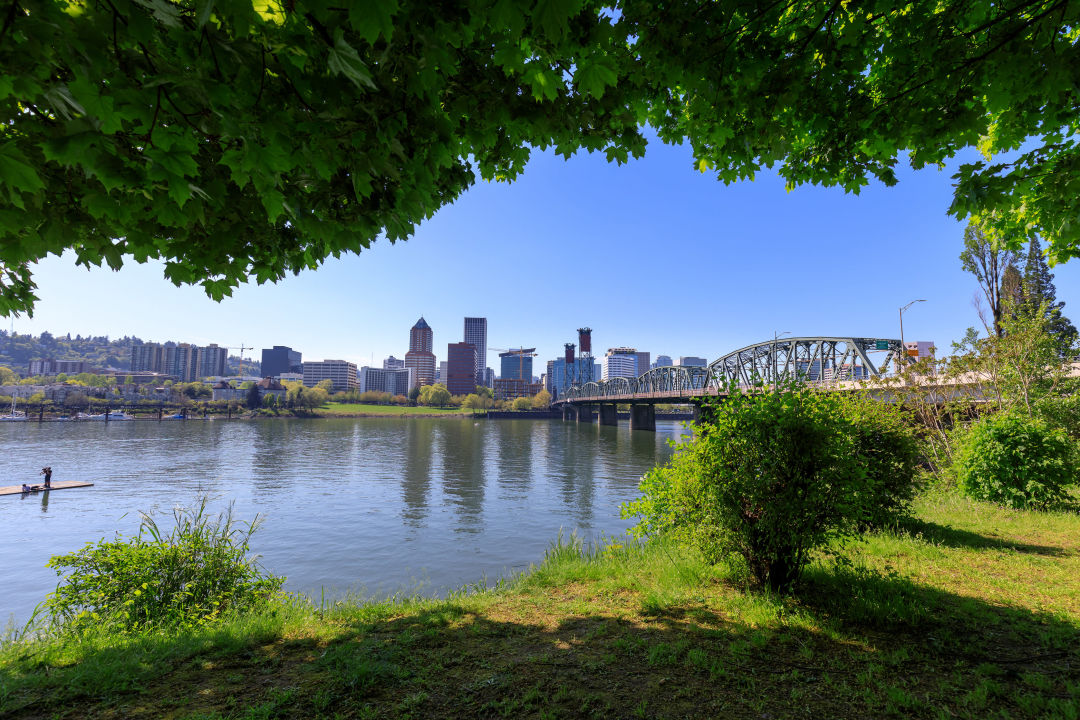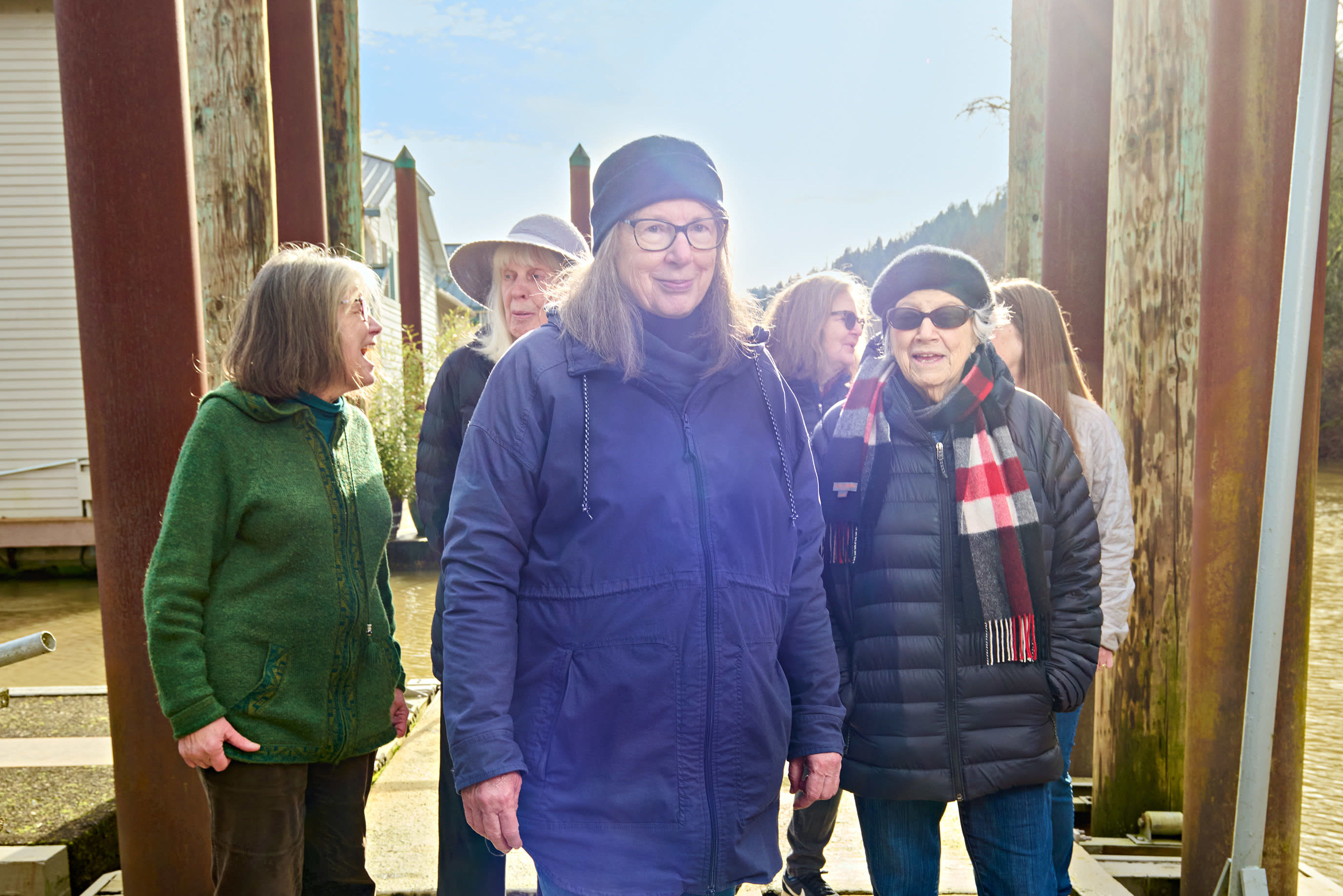Is Portland a Good Place to Retire To?

Image: ARTYOORAN/shutterstock.com
Charles “Bud” Garrison had wide-ranging plans for life in retirement once he finished a 12-year stint in management at Oregon Health and Science University. He envisioned himself volunteering with an animal shelter in Portland and helping his wife, Danni Duggan, 52, build her real estate business and, best of all, hitting the road—traveling to China, perhaps, or somewhere equally distant and alluring. Garrison, 60, smirks a bit as he recalls, “My plan was to take my elderly gap year.”
This story is part of our Wisdom feature. Jump to a story:
Secrets of Our Wisest Portlanders / The 50-Year Portland Friendship / Can Third-Act Careers Work Out? / Wise Oregonians Give Us Their Best Advice / Lifestyles of the Happy and Gray / How Much Does Living in a Senior Community Cost in Portland? / The Portland Art Gallery Where Age Is an Asset
That’s not what came about, though, after he retired in December 2019. The ensuing months brought unexpected additions to his household.
Did someone say best-laid plans ... ?
Here’s what happened: Shortly after Bud retired, Danni’s mom, Diane, began experiencing health issues in Florida. Danni found herself spending more time in the Sunshine State than in the Sunnyside neighborhood she and Bud have called home since 2003. The couple finally determined that moving Diane to Portland would be easier on everyone. So amid the COVID lockdown of summer 2020, Diane relocated to the couple’s 1913 Craftsman—and Bud’s retirement reality suddenly shrunk. There was his mother-in-law living in a spare bedroom and joining the couple for most meals. There was Danni running her real estate business from the dining room table. This was not the gallivanting year he’d imagined.
At the beginning of 2021, Bud and Danni decided to build a two-level, 1,200-square-foot home behind their house, one that gave Diane, 76, her own living space on the ground floor, Danni her own office on the second floor, and Bud some peace of mind. It was a sizable investment—upward of $300,000—that included sweat equity. Bud installed the crown molding, the wood floors, and the kitchen cabinets. A good bit of work for a retired guy. But one recent afternoon, as he sat in Diane’s living room, his mother-in-law watching TV and relaxing comfortably on the couch (and a good 18 feet from his house), Bud told me, “The big benefit is we can have family here that we can support.” Plus, he has a new long-term vision of life in Portland as a retiree. One day, he said, the backyard house may become a rental property and a revenue-generator for the couple. Or it may become their age-in-place home, provided they can downsize enough to rent out the main house. If anything, Bud says, “We have options. A lot of options.”
Options, it seems, are essential to Portland living these days, especially for retirees, to whom they’re as indispensable as a flush 401(k) or a reliable pickleball partner. For more than a month, I interviewed real estate agents and developers who specialize in the senior crowd, policy wonks who study aging issues and trends, and doctors who specialize in keeping geriatrics healthy and active, plus dozens of card-carrying AARP members. Some were longtime Portland residents, like Bud Garrison. Others were newbies, arriving in town well into their 60s and 70s—like Linda Mather, who moved to Portland at 71 after a lifetime of commuting into Manhattan from New Jersey for theater and museums. But after one show at the Portland Art Museum, Mather was sold on her new city. “It was Ansel Adams, and it was me and six other people,” says Mather, now 81, who lives in a retirement community near downtown. “I kept looking around to find where everybody else was. It was so delightful. You could see the pictures.”
Others I talked to admitted they had given up on Portland, figuring urban life was no longer their thing. They soon reversed course. “We like the shows and the theater and the culture,” says Sally Petersen, 91, who, with her husband, Jim, 90, returned to the metro area after two-plus years in Lincoln City. Then there are those who vowed never to return, and haven’t. “The quality of life really started to deteriorate,” says Jack Pfeifer, 77, who abandoned Portland’s Northwest District after break-ins to his storage unit and the theft of his car. “After a couple of years of that I said I am not living like this anymore.” He split for Lake Oswego.
After all the insights shared and anecdotes relayed and statistics spliced, this is what I know: Portland is hardly Palm Springs, but it offers plenty of options for the retiring set able to access them, who are lured by the natural beauty that has long attracted people (of all ages), plus new zoning laws that allow for two—and sometimes more—dwellings on lots where only single homes once stood. The latter is significant: People can more easily age next door to their kids and grandkids. Trish Trout has spent most of her 81 years in the Laurelhurst neighborhood. “My family has lived on the same street since World War II, since the ’40s. It’s just the most wonderful place and the most wonderful people,” Trish told me. “I will never leave this street.” But to make that work, she agreed to have a backyard home built so her daughter Kat could be nearby—and, if necessary, be her caregiver. “I knew my mom wanted to stay at home, like her mother did before her and her mother did,” says Kat, 52, who lives in the backyard house. “She’s spry, and it would be limiting to ask her to move into assisted living. [She’s] ingrained in this neighborhood.”
Options, though, come with a price tag. Affordability is a recurring theme when talking to policymakers and retirees. Portland may be less expensive than such West Coast rivals as San Francisco and Seattle, but many older residents—especially those on fixed incomes—find the city’s housing costs and taxes stultifying. “I’d love to say that we’re an amazing place to retire, but I think that there are challenges in a number of ways,” says urban gerontologist Alan DeLaTorre, who studies Portland’s urban and aging culture as an adjunct professor at Portland State University.
Last year, when he was manager of the Age-Friendly City program for Portland’s Bureau of Planning and Sustainability, DeLaTorre helped develop dozens of recommendations to make the city more habitable for those who are older or disabled (or, perhaps, both). Suggestions ranged from improving transit stops so seniors can more easily access buses to expanding lower-income housing for aging Portlanders. Right now, middle- and upper-income older residents can experience more of what the city has to offer, he says, but “for those lower-income older adults, there tends to be a harder time finding housing.”
Consider Garrison’s strategy of adding a backyard home to his property: Garrison’s property taxes jumped from $5,500 in 2019 to $9,575 in 2023, with the unit in place. For this reason, some retirees dodge Portland taxes altogether, by doing what Mark and Debra Mather (no relation to Linda) did. When relocating from Silicon Valley to be closer to their daughter and son-in-law in Portland, they ended up in Vancouver, Washington—and sidestepped Portland’s property taxes and Oregon’s income tax while just a car drive away from Oregon’s zero percent sales tax. “We bought a brand-new, large TV when we moved in here,” Debra recalls. “We went across to Costco, right over the bridge.”
Like we said, options.
Downtown Portland offers its share of cultural attractions, but they come with an equal number of frustrations, from traffic to safety concerns. Nancy Flynn, 68, moved to Portland from Corvallis with her husband in 2007. Before COVID she would often take TriMet, but she says that for health and safety reasons she’s now reluctant to take public transit. “Maybe they should have senior jitney buses to take us downtown for free,” she proposes.
The city’s safety challenges—and enormous image problem stemming from those issues—may be why Portland is seeing just as many seniors uproot from the city as migrate in. In aggregate, “it used to be each year several thousand people 65 and older were moving into Portland. The trend is definitely downward,” says Mike Wilkerson, director of analytics at ECOnorthwest, a research firm that studies land and housing. “It’s getting closer to break-even.” Those who leave, Wilkerson says, head not just to the usual, climate-friendly, retiree destinations—Las Vegas, Phoenix, Hawaii—but also right across the Columbia River: to Clark County and those lower taxes.
For those who remain, higher or lower income and assets create very different day-to-day realities. Abe Cohen and Anjala Ehelebe have witnessed that dynamic from two distinct perspectives, despite living in neighboring parts of the city. Cohen is 74 years old, white, and a retired chiropractor living in Northeast Portland. Ehelebe is 68, biracial, and retired from a variety of jobs, including financial planning. First, let’s give you Ehelebe’s vantage point.
Ehelebe understands the challenges of making, and keeping, Portland’s neighborhoods diverse into and through retirement. She grew up in the Eliot neighborhood and, after attending college, has lived near Woodlawn Park since 1984. She stayed even when many of her neighbors fled elsewhere after a series of crime-related incidents in the 1990s, when property values sunk. “I bought my house for $45,000, but its value dropped to $25,000,” she says. The area has since rebounded, and home prices have risen, so much that it’s hard, according to Ehelebe, for people of color—and people of color in her age group—to buy in. “It used to be 40 percent Black, and now it’s something like 15 percent Black,” she says. “There are other races, but it’s no nowhere near what it was.”
Recently, she reached out via Facebook to Black retirees she knows and asked them about being retired in Portland. Some said they felt financially insecure; they hadn’t worked for businesses that offered generous-enough retirement plans and are now taking on part-time jobs in retirement, while others are working into their 70s. And unlike Ehelebe, who has a Black neighbor on one side of her house and a Mexican family on the other, and white neighbors across the street, a lot of the retired people of color she knows find the city “alienating.”
“I think aging [in Portland] for Black people is pretty lonely,” says Ehelebe. “There’s not the sense of community that you would get in places with more robust Black communities.”
Then there’s Abe Cohen, who lives with his wife, Nora Stern, not too far from Ehelebe, in one of the 16 solar-paneled homes smartly arranged in a cohousing community called Cully Grove. On a mild afternoon, Cohen, a resident of Cully Grove since it opened in 2013, walked me through the two-acre development, which is clustered around shared amenities like a vegetable garden; a common house, where neighbors hold meetings and often dine together; and a “fruit forest” of persimmon, figs, plums, and pears. Cohen has been known to kick a soccer ball around with kids in Cully Grove and shuttle them to practices, tasks which he opted for over a traditional retirement community. “My vision was about being around people, and people who form a history together and a community,” Cohen says, “and it’s not always easy. But it has been so nice to have that familiarity with people who live right by you and interact with you.”
For the most part, Cully Grove has served Cohen’s needs. He spends most days helping with chores around the community and volunteering in the neighboring areas. As we stand by the vegetable garden, though, he shares that as the kids grow and start moving away, younger families are not moving in. “The units are expensive; they’ve always been expensive,” he says. Originally, homes in Cully Grove sold in the $400,000–450,000 range. Most home values have since nearly doubled, and one recently listed for more than a million dollars. For Cohen, that means Cully Grove is “not diverse, mostly by income—and because of that by race.” He looks out at the garden. “I would have liked it to have been more diverse.”

Image: tusharkoley/shutterstock.com
In 2006, Portland was the only US city to take part in the World Health Organization’s Global Age Cities project. The designation spotlighted what the city had done to date for its older residents, as well as what it hoped to do going forward. In the years that followed, some improvements for older residents ensued. But the latest Age and Disability–Inclusive Neighborhood Plan from the city’s Bureau of Planning and Sustainability is a hefty 67 pages and thick with action steps, indicating that the city is still far from achieving its goals.
As DeLaTorre says, the city is worrying not just about today’s aging boomers and ever-more-creaky Gen Xers; there’s a wave of millennials inching toward AARP status, too, so the need for housing “is only going to increase.” Developing retirement villages and continuing-care facilities, he adds, won’t be the answer, because they’re too expensive for many people—and lack the familiarity Portlanders have come to rely on in the neighborhoods where they’ve lived and raised families. “How do we allow them to age in community?” asks DeLaTorre. “And by aging in community that means staying connected to the people and places that they know. It’s being comfortable with where they get their hair cut, where their faith-based practices are occurring, where they know the name of the cashier at the grocery store.” DeLaTorre’s thoughts are supported by an AARP survey that found that 77 percent of adults 50 and over want to age in place.
Among the Portland retirees I spoke with, many aren’t waiting for the city to make their lives livable and meaningful. They’re doing it themselves. In 2015, Don Friedman retired after 30 years as a lawyer and corporate executive. At first, he surveyed cities to potentially relocate to, and concluded that there was no reason to leave the Northeast Portland area he’s called home since arriving in 1983. One reason: “There’s great golf,” Friedman, 70, says with a chuckle, “and you can play year-round.”
For him, the first couple of years in retirement were tricky, adjusting to not going “120 miles an hour.” But he connected with volunteer organizations, including Friends of the Columbia Gorge and a program that serves homeless youth. “I asked friends, ‘Look, I’m interested in serving or working in the nonprofit world—do you have any ideas?’ Pretty much everyone did,” Friedman says. “That’s what I like about Portland: When I first moved here it wasn’t that you had to be here for a long time before you could find access into either jobs or volunteer stuff. It’s an open, inviting environment.”
For those who could use a networking nudge, the “village” movement has been a boon to many who want to age in their homes. Since 2015, 10 villages—similar to the naturally occurring retirement communities, or NORCs, that became popular around Boston two decades ago—have launched in the metro area. For a nominal fee, members in these informal, geographical-based associations can access services they might otherwise get only in a retirement or continuing-care residence: asking a village volunteer for a ride to a doctor’s appointment, for example, or help with setting up a holiday display. Portland’s first such group, Eastside Village, started with 20 members. Today, it has close to 200 retirees from 23 neighborhoods.
Ehelebe belongs to North Star Village and says she’s connected with not just services, but a group of retirees she never would have met, including a number of women “who have had amazing lives”—so much so that she’s writing a graphic novel based on their stories, about people who challenge stereotypes of senior citizens. “It’s great fun.”
Speaking of fun, let’s get back to Bud Garrison. Now that his mother-in-law is settled into the backyard house, he’s put away his tool belt, and leaned into the options of his choosing. There’s the Peloton in the spare room of his backyard dwelling, and he and Danni have used the upstairs space to host college alumni events. He’s teaching a bit at OHSU and has taken a more formal role at the animal services agency where he had volunteered. He’s hardly in a retiring mode. But one option is increasingly less likely: moving out of Portland. As Bud tells me, “I’ve never quite understood the philosophy of people who spend their whole life in a neighborhood or a city and then retire and move somewhere completely different.” He stops for a second, then asks, “Wouldn’t I want to stay in the place where I built my life?”




